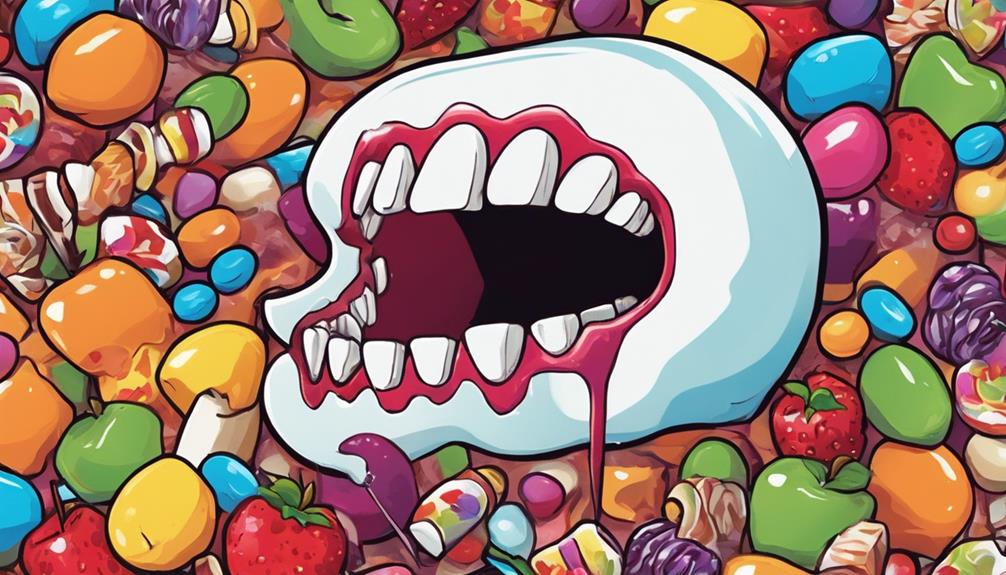You might be surprised to know that many dental myths could be jeopardizing your oral health. For instance, brushing harder doesn't clean your teeth better; in fact, it can damage your gums and enamel. Flossing is essential, not optional, for keeping gum disease at bay. Bleeding gums aren't normal and can signal serious issues. Also, white teeth don't always mean good health, and mouthwash shouldn't replace brushing. Baby teeth need care too! Understanding these myths is key to maintaining a healthy smile. If you explore further, you'll uncover even more truths about your dental health. Dental myths debunked reveal that chewing gum with sugar isn’t a good alternative to brushing, and skipping regular dental check-ups can lead to serious problems that could have been prevented. Understanding the truth about these myths can help you make informed decisions and take better care of your oral health. So remember, don’t fall for common dental myths – take the time to educate yourself and talk to your dentist for accurate information. Dental myths debunked will help you maintain a healthy smile for years to come.
Key Takeaways
- Brushing harder does not clean teeth better; use gentle techniques with a soft-bristled toothbrush to avoid damaging gums and enamel.
- Flossing is essential for preventing gum disease and cavities; make it a daily habit for optimal oral health.
- Bleeding gums indicate potential gum disease; seek immediate dental care to prevent further complications.
- Regular dental check-ups are crucial for early detection of issues, preventing severe dental problems down the line.
Brushing Harder Cleans Better

Many people believe that brushing harder leads to cleaner teeth, but this misconception can actually harm your gums and enamel. In reality, using excessive force while brushing can damage your gums and erode tooth enamel over time. Instead, focus on incorporating proper techniques into your oral hygiene routine.
Using a soft-bristled toothbrush is key. These brushes effectively clean your teeth without causing trauma to your gums. When you brush, apply light pressure and use gentle circular or vertical motions rather than aggressive horizontal scrubbing.
Studies have shown that aggressive brushing can lead to gum recession, which increases your risk of periodontal disease and tooth sensitivity. The American Dental Association has highlighted that effective plaque removal can be achieved through gentle brushing techniques.
Flossing Is Optional

You might think flossing is optional, but the truth is it plays an essential role in your oral health.
It helps remove food particles and plaque from areas your toothbrush can't reach, reducing the risk of cavities and gum disease.
Let's explore the benefits of flossing, debunk some common myths, and discuss techniques to make it easier.
Flossing Benefits for Health
While some might consider flossing optional, its role in preventing gum disease and cavities is backed by considerable evidence. You may think brushing alone is enough, but toothbrushes can't always reach the tight spaces between your teeth. Flossing effectively removes food debris and plaque from these areas, greatly enhancing your dental hygiene routine.
Regular flossing not only helps prevent gum disease but also promotes overall oral health. Studies show that consistent flossing can reduce gingivitis, an early stage of gum disease that can escalate into more severe problems if ignored. Additionally, flossing contributes to fresher breath by eliminating bacteria and food particles that toothbrushes often miss.
Even if you don't see immediate symptoms, neglecting to floss can lead to long-term health issues. Tartar buildup, which can result from inadequate cleaning between teeth, can complicate your dental care efforts.
Debunking Flossing Myths
The belief that flossing is optional undermines its essential role in maintaining dental health and preventing gum disease. Many people overlook how important it is to clean the spaces between your teeth, where toothbrushes often can't reach. Flossing effectively removes plaque and food particles, helping to reduce the risk of cavities and gum disease.
While some might argue that the lack of conclusive evidence means flossing isn't necessary, this doesn't negate its potential benefits. Regular flossing can notably lower gum inflammation and tartar buildup—two major contributors to conditions like gingivitis and periodontitis. If you want to keep your oral hygiene in check, incorporating flossing into your daily routine is crucial.
The American Dental Association continues to recommend daily flossing as part of a thorough approach to ideal dental health. Remember, even if it seems like a hassle, taking just a few minutes each day to floss can lead to healthier gums and a brighter smile.
Ultimately, making flossing a habit is an investment in your long-term oral health, making it anything but optional.
Flossing Techniques to Consider
What flossing techniques can enhance your oral hygiene routine and make the process more effective?
First, consider using a gentle sawing motion when you slide the floss between your teeth. This helps prevent damaging your gums, which can lead to gum disease. Make sure to curve the floss around each tooth in a C-shape, ensuring you clean below the gum line where plaque typically accumulates.
If traditional floss feels cumbersome, try floss picks or interdental brushes. These tools can be easier to maneuver and reach tricky spots, reducing the risk of dental issues. Remember to floss at least once a day, ideally before brushing, to remove food debris and plaque that your toothbrush might miss.
While some debate the necessity of flossing, it plays a crucial role in maintaining oral hygiene. Regular flossing can effectively reduce the risk of bad breath and prevent the buildup of tartar, which can lead to cavities.
Even if you're skeptical, incorporating flossing into your routine might offer significant benefits for your gum health and overall dental well-being. So, give these techniques a try and see how they work for you!
Bleeding Gums Are Normal

If you're experiencing bleeding gums, you shouldn't brush it off as normal.
This common issue often signals plaque buildup or even gum disease, which can lead to more serious problems if ignored.
Regular dental check-ups play an essential role in catching these issues early, so don't hesitate to schedule your next appointment.
Causes of Bleeding Gums
Bleeding gums aren't something to ignore; they often signal issues like gum disease that need attention. If you notice bleeding gums during brushing or flossing, it's a warning sign that your oral hygiene might require improvement.
This symptom is commonly associated with gingivitis, an early stage of gum disease caused by plaque buildup. When plaque isn't removed effectively, it can irritate your gums, leading to inflammation and bleeding.
Don't dismiss bleeding gums as a normal part of your dental routine. If this issue persists, it's vital to take action. Ignoring it can allow gum disease to progress to more severe conditions, potentially resulting in tooth loss.
Regular dental check-ups play an essential role in monitoring your gum health and catching any signs of bleeding early on.
Importance of Dental Check-ups
Regular dental check-ups are essential for maintaining your gum health and catching issues like gingivitis before they worsen. If you notice bleeding gums while brushing, don't dismiss it as normal. It could be a sign of gum disease that needs professional evaluation.
Here's a quick overview of the importance of dental check-ups:
| Frequency | Benefits | Consequences of Ignoring |
|---|---|---|
| Twice a year | Early identification of gum disease | Advanced gum disease, tooth loss |
| Professional cleaning | Removes plaque and tartar | Increased risk of cavities |
| Education | Learn about oral health | Misunderstanding of oral hygiene |
| Personalized care | Tailored advice for your needs | Neglected dental issues |
Ignoring bleeding gums can lead to severe health complications. Regular check-ups not only help in the early detection of gum disease but also facilitate professional cleaning, vital for your overall oral health. Make sure to prioritize your visits to the dentist, as timely care can save you from more serious problems down the line. Don't wait until it's too late!
Only Sugar Causes Cavities

Many people believe that only sugar causes cavities, but starchy foods can contribute just as much to tooth decay. When you consume sugar or starch, harmful bacteria in your mouth feast on these substances, producing acids that erode your tooth enamel.
Here are three key points to remember:
- Starchy Foods Break Down: Foods like bread and pasta break down into sugars, providing a food source for cavity-causing bacteria.
- Bacteria Thrives on Residue: If you don't maintain good oral hygiene, leftover food particles can lead to an increase in harmful bacteria and, consequently, cavity formation.
- Dry Mouth Matters: A dry mouth reduces saliva, which helps wash away food particles and neutralize acids, intensifying cavity risk.
To effectively prevent cavities, you need to adopt a thorough approach. This includes not only limiting sugar and starchy food intake but also maintaining proper oral hygiene through regular brushing and flossing.
Don't underestimate the role of good habits in fighting cavities—it's not just about sugar!
White Teeth Indicate Good Health

You might think that white teeth mean you're in great dental health, but that's not always the case.
Discoloration can come from many factors, and regular exams are key to spotting real issues.
Instead of focusing solely on color, it's more important to pay attention to your overall dental care and hygiene.
Color Misconceptions Explained
Tooth color often misleads people into believing that white teeth equate to good oral health, but this isn't always the case. Discoloration can stem from various factors—diet, age, or smoking—rather than indicating dental issues. In fact, many individuals with yellow teeth may still maintain excellent health.
Here are some key points to take into account:
- Healthy Gums: You can have yellow teeth and perfectly healthy gums without any cavities, proving that color isn't the only indicator of dental health.
- Underlying Issues: Tooth color doesn't reveal hidden problems. Regular dental check-ups are essential for identifying issues that aren't visible just by looking at your teeth.
- Misconceptions Lead to Anxiety: Worrying about the color of your teeth can cause unnecessary stress about your dental health.
Understanding these misconceptions can help you focus on what truly matters—maintaining proper hygiene and visiting your dentist regularly. Remember, good oral health is multifaceted and doesn't solely rely on the whiteness of your teeth.
Regular Exams Essential
Relying on the appearance of white teeth can be misleading, as regular dental exams are the only reliable way to confirm your overall oral health is on track. Many people fall victim to common misconceptions, believing that white teeth equate to good dental health. However, factors like age, diet, and lifestyle choices can influence tooth appearance without indicating underlying issues.
Regular dental checkups, typically recommended every six months, play an important role in identifying problems such as cavities and gum disease that mightn't be visible or symptomatic. By prioritizing these visits, you secure timely treatment and prevent more serious complications down the line.
Moreover, maintaining good oral hygiene practices is vital, but it shouldn't stop at simply brushing and flossing. Regular exams provide professional cleaning and a chance for your dentist to track any changes in your dental health, reinforcing the importance of thorough care.
Educating yourself about dental health and understanding that white teeth don't necessarily reflect good health can motivate you to adopt better care practices, including those all-important regular dental checkups.
True Health Indicators
The belief that white teeth automatically signify good health can be misleading, as many factors influence dental appearance.
Don't fall into the trap of thinking that just because your teeth are bright, your dental health is perfect. Here are three important points to take into account:
- Discoloration Isn't Always Bad: Yellowing teeth can result from age, diet, or habits like smoking, and may not indicate any underlying health issues.
- Regular Check-ups Matter: Maintaining good oral health goes beyond aesthetics. Regular dental exams help catch problems like cavities and gum disease before they escalate.
- True Indicators of Health: Healthy gums, absence of pain, and overall comfort while chewing are better indicators of good dental health than the color of your teeth.
Dental Visits Are Unnecessary Without Pain

Why assume that you only need to see the dentist when you're in pain? This common dental myth can lead to serious consequences for your oral health. Many dental issues, like cavities and gum disease, can develop silently without any pain or discomfort. By the time you feel something's wrong, it might be too late for simple treatments.
Routine dental visits every six months are essential for detecting these hidden problems early. Regular check-ups help your dentist identify early-stage conditions, allowing for timely intervention. If you skip appointments, you risk more severe complications that could result in costly, painful procedures down the line.
Additionally, maintaining oral health isn't just about preventing pain. Poor oral hygiene can contribute to systemic health issues, affecting your overall well-being. So, don't wait for discomfort to prompt a visit.
Make dental visits a priority, regardless of whether you feel pain. Your future self will thank you for taking proactive steps towards a healthier smile and better health overall. Remember, prevention is always easier—and cheaper—than treatment!
Mouthwash Replaces Brushing

Mouthwash might refresh your breath, but it can't replace the essential cleaning that brushing and flossing provide. While mouthwash can kill some bacteria, it lacks the mechanical action that removes plaque and food particles effectively. Relying solely on mouthwash can jeopardize your oral hygiene and overall dental care.
Here are three key reasons why mouthwash shouldn't replace brushing:
- Plaque Removal: Mouthwash doesn't remove plaque the way brushing does. Brushing and flossing are necessary for effective plaque control.
- Food Particles: Mouthwash may mask odors, but it won't eliminate food particles stuck between teeth. Only flossing can do that.
- Potential Risks: Many mouthwashes contain alcohol, which can dry out your mouth. A dry mouth can increase your risk of cavities and gum disease.
To maintain ideal oral hygiene, make sure you brush your teeth twice daily and floss regularly. Mouthwash can be a great addition to your routine, but remember, it's not a substitute for the fundamental practices of dental care.
Baby Teeth Don't Need Care

Many parents believe baby teeth don't need care, but neglecting them can lead to serious oral health issues. Baby teeth, or primary teeth, are crucial for your child's development. They help with chewing, speaking, and maintaining space for adult teeth. When you ignore their care, you risk tooth decay, which can negatively impact the growth of permanent teeth and your child's overall health.
Establishing a routine of oral care for baby teeth is essential. This includes brushing twice a day with fluoride toothpaste and limiting sugary snacks. Regular dental visits should start by age one. These visits allow the dentist to monitor the condition of baby teeth and address any problems early on.
Healthy primary teeth guide permanent teeth into their proper positions, preventing future misalignment and orthodontic issues.
Professional Whitening Damages Teeth

Although some believe professional whitening damages teeth, when performed by a dentist, it's actually safe and effective.
Professional whitening treatments are designed to minimize enamel erosion while improving your smile. Here are three key reasons why you shouldn't worry:
- Supervised Safety: Dentists use controlled concentrations of whitening agents, ensuring your enamel remains intact. They also apply protective barriers to your gums, reducing the risk of irritation.
- Less Erosion: Studies show that professional whitening causes considerably less enamel erosion compared to over-the-counter products, which might contain harsher chemicals that can harm your teeth.
- Temporary Sensitivity: While you may experience some sensitivity post-treatment, it typically subsides within a few days. This is a common reaction and doesn't indicate lasting damage.
Dental Care Is Only for Adults

Ignoring dental care for children can lead to serious health issues and complications down the road. Many believe that dental care is only necessary for adults, but that couldn't be further from the truth. Early dental care is essential for your child's oral health. The American Dental Association recommends scheduling their first dental visit by age one, ensuring they start off with a healthy foundation.
Children's baby teeth play a significant role in their ability to eat, speak, and align permanent teeth. Neglecting their dental care can result in cavities and infections, which don't just stay in the mouth—they can affect your child's overall health. Regular checkups help identify potential problems early, allowing for timely interventions before they escalate.
Establishing a dental home early on not only promotes proper dental hygiene but also helps children become familiar with dental visits, reducing anxiety. By prioritizing dental care for your children, you're setting them up for a lifetime of good oral health.
Frequently Asked Questions
What Is the #1 Reason Why People Don't Go to the Dentist and Suffer From Gum Disease?
The #1 reason you might avoid the dentist is fear of pain. This fear can lead to untreated gum disease, making it essential to understand that preventative care can help you avoid future discomfort and complications.
Is It OK to Never Go to the Dentist?
Is it really okay to never go to the dentist? Skipping visits can hide serious issues like cavities and gum disease. Regular check-ups keep your smile healthy and prevent painful problems down the line.
Are Teeth Ever Beyond Repair?
Yes, teeth can be beyond repair. If decay, damage, or gum disease is severe, you might need extractions or complex treatments. Regular check-ups help catch issues early, preventing irreversible damage to your teeth.
Can Bad Teeth Affect Your Thinking?
Your bad teeth can cloud your mind like a stormy sky, affecting your thinking. Inflammation from gum disease can enter your bloodstream, potentially impacting cognitive health and increasing the risk of mental decline over time.
Are any of the dental myths related to early signs of gum disease?
Many dental myths claim that bad breath or bleeding gums are not early signs of gum disease. However, these are actually common early signs of gum disease that should not be ignored. It is important to seek professional advice if you experience any symptoms of early signs of gum disease.
Conclusion
It's time to set the record straight on these dental myths.
Believing in these misconceptions can lead to poor oral health, so don't let misinformation lead you down the wrong path.
By understanding the truth about dental care, you can keep your smile shining bright and your teeth healthy.
Remember, an ounce of prevention is worth a pound of cure—so stay informed and take charge of your dental hygiene for a lifetime of healthy teeth!









